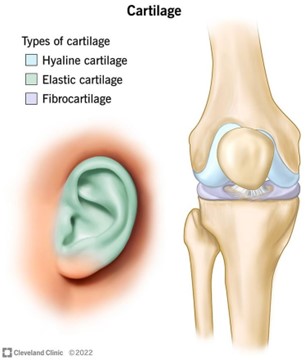A nurse is reinforcing teaching with an older adult client about physical changes that occur with aging. Which of the following should the nurse include as an expected age-related change?
Increased nail growth due to buildup of calcium deposits
Increased perspiration due to overproduction by the sweat glands
Increased cardiac output due to weakened heart walls
Increased joint stiffness due to loss of elasticity in joint cartilage
The Correct Answer is D
d. Increased joint stiffness due to loss of elasticity in joint cartilage.
Explanation:
The correct answer is d. Increased joint stiffness due to loss of elasticity in joint cartilage.
When teaching an older adult client about age-related changes, it is important for the nurse to provide accurate and relevant information. Joint stiffness is a commonly experienced age-related change that occurs due to the natural loss of elasticity in joint cartilage. As people age, their joints may become stiffer and less flexible, making movements and activities more challenging.
Option a is not the correct answer. Increased nail growth due to the buildup of calcium deposits is not an expected age-related change. Nail growth is primarily determined by factors such as genetics, overall health, and nutritional status, rather than calcium deposits.
Option b is not the correct answer. Increased perspiration due to overproduction by the sweat glands is not an expected age-related change. In fact, older adults may experience a decrease in the production of sweat, which can make them more susceptible to heat-related illnesses and dehydration.
Option c is not the correct answer. Increased cardiac output due to weakened heart walls is not an expected age-related change. With aging, the heart muscles may become stiffer and less efficient, leading to a decrease in cardiac output rather than an increase.
By focusing on the expected age-related change of increased joint stiffness due to loss of elasticity in joint cartilage, the nurse can provide accurate information and help the older adult client understand and manage this common aspect of the aging process.

Nursing Test Bank
Naxlex Comprehensive Predictor Exams
Related Questions
Correct Answer is ["A","B","D","F"]
Explanation
Answer: A, B, D, F
Rationale:
A. "The ECT procedure will cause you to have a brief seizure.":
This statement is accurate as electroconvulsive therapy (ECT) intentionally induces a controlled seizure, which is thought to positively impact brain chemistry and alleviate symptoms of major depressive disorder. Educating the client about this aspect helps demystify the procedure and reduces anxiety.
B. "You will not be awake during the ECT procedure.":
The client receives general anesthesia before ECT, so they will be unconscious during the procedure. This reassurance can help alleviate fears associated with being awake and experiencing discomfort during the procedure.
C. "You will be placed on a ventilator to help you breathe during the ECT procedure.":
During ECT, clients do not require a ventilator, although they may receive oxygen support. An anesthetic and muscle relaxant are administered, and while the client’s breathing is closely monitored, a ventilator is unnecessary for this brief procedure.
D. "You will probably sleep the rest of the day following the ECT procedure.":
Many clients feel drowsy and need extra rest after ECT due to the effects of anesthesia and the brief seizure. Informing the client helps them prepare for this common effect and sets realistic expectations for their recovery period.
E. "It should only take one ECT treatment to bring you out of your depression.":
ECT is typically given as a series of treatments over several weeks to achieve lasting improvement in depressive symptoms. One treatment alone is usually insufficient, so this statement could mislead the client regarding the treatment plan.
F. "Some clients experience temporary memory loss following ECT therapy.":
Temporary memory loss, especially of recent events, is a known side effect of ECT. This side effect is generally transient but can help the client to be aware of this possibility, helping them to anticipate and manage any concerns post-treatment.
Correct Answer is D
Explanation
Answer: (D) A client has the right to view their medical record
Rationale:
A) The actual medical record belongs to the client: While clients have the right to access their medical records, the physical medical record itself typically belongs to the healthcare provider or facility that created it. The client does not own the physical document but has the right to view or obtain copies of it under HIPAA regulations.
B) A client's medical record information remains confidential, even during an emergency: While confidentiality is a core principle of the HIPAA Privacy Rule, there are specific exceptions during emergencies. For instance, healthcare providers may share information if it is necessary to provide care or if there is an imminent threat to the client or others. Thus, confidentiality can be adjusted in critical situations.
C) If the client dies, their family receives their medical record: A client’s medical records do not automatically go to their family after death. Access to a deceased person's medical records is typically granted to the executor of the estate or a legal representative, and specific legal processes must be followed. Therefore, this statement is incorrect.
D) A client has the right to view their medical record: Under the HIPAA Privacy Rule, clients have the right to access and view their medical records. They can request copies of their records, review them, and request amendments if they believe there are errors. This right is fundamental to ensuring transparency and accuracy in medical documentation.
Whether you are a student looking to ace your exams or a practicing nurse seeking to enhance your expertise , our nursing education contents will empower you with the confidence and competence to make a difference in the lives of patients and become a respected leader in the healthcare field.
Visit Naxlex, invest in your future and unlock endless possibilities with our unparalleled nursing education contents today
Report Wrong Answer on the Current Question
Do you disagree with the answer? If yes, what is your expected answer? Explain.
Kindly be descriptive with the issue you are facing.
